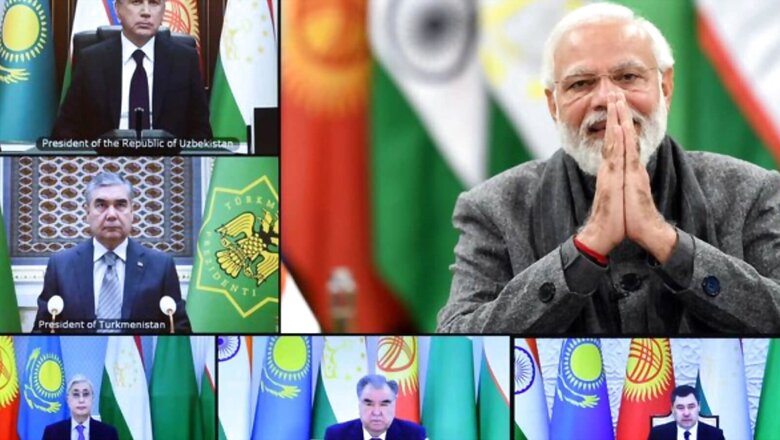
views
India’s outreach to the Central Asian region has amplified over last few years. The ‘India-Central Asia Summit’ held on January 27, 2022 marks a high point for the ties with the region. It has come on the 30th anniversary of establishment of diplomatic relations between India and the Central Asian countries and spells out an ambitious vision for the future course. This first engagement of its kind saw participation of Prime Minister Narendra Modi and Presidents of Kazakhstan, Kyrgyz Republic, Tajikistan, Turkmenistan and Uzbekistan.
PM Narendra Modi in his opening remarks said, “Central Asia is central to India’s vision of an integrated and stable extended neighbourhood.” He also listed out three objectives of the Summit: close cooperation in regional security, creating framework of interactions and roadmap for cooperation. Key takeaways from this summit include establishment of India-Central Asia secretariat, joint working group on Chabahar, joint counter-terror exercises and annual ministerial meetings at foreign, trade and cultural levels. India has promised to receive an annual 100-member youth delegation and train the diplomats. These initiatives are in line with India’s ever-expanding cooperation with this strategically important region.
As a matter of fact, India’s proactive engagement with Central Asia is part of its larger foreign policy objective. Prime Minister Modi has sought to expand the relations with neighbouring regional blocs. Invitation to SAARC countries to attend PM’s oath-taking ceremony in 2014 was a case in point. This was followed by various initiatives to engage Central Asia, Africa, the Gulf and South East Asia. These diplomatic overtures reiterate how India is trying to balance its relations in the maritime as well as continental domain. It is also a testimony to India’s image as an emerging power, which has the ability to engage regional countries at a single forum. The recently concluded India-Central Asia summit can be seen through this prism.
This summit underlines the significance of Central Asia as a whole. First, the region (quite literally) is centrally located. Although ‘landlocked’, it acts as a bridge between various regions, and is critical for connectivity projects. Second, it is rich in natural resources, including oil, gas and uranium, which is a boon for energy hungry countries like India. Third, with a population of about 72 million, it is a potential market for Indian exports. Last, the region has been vulnerable to security challenges, more so because of its proximity with Afghanistan. The situation has worsened in the wake of the Taliban resurgence.
Apart from these factors, each of these countries is individually important for India. Kazakhstan is abundant in natural resources, and thus, important in India’s quest for energy security. It is India’s largest trading partner in the region that includes uranium import. Kyrgyzstan is a vital player in the fields of education and high-altitude research. Tajikistan is an important security partner. The Indian government has appreciated its role in recent evacuations of stranded Indians from Afghanistan. Turkmenistan is critical for energy and connectivity. It has world’s fourth largest gas reserves; the under-construction TAPI (Turkmenistan–Afghanistan–Pakistan–India Pipeline) pipeline starts from here. It is an important partner in connectivity initiatives like Ashgabat Agreement. Uzbekistan is India’s strategic partner with ties in multiple spheres. Security cooperation between the two has reached a new high in recent years.
India’s relations with Central Asia have seen an upward swing in recent past. It received a boost after Prime Minister Modi’s visit to all five countries in 2015. This was followed by India joining the Shanghai Cooperation Organisation or the SCO in 2017 and the launch of India-Central Asia Dialogue at foreign ministers’ level in 2019. These efforts were accompanied by exchanges of visits and establishment of joint working groups. The relation has expanded in areas like defence, counter-terrorism, trade, energy, investment, IT, education, skill development, health and tourism. India has recently announced $1-billion line of credit for development projects in the region. The supply of medical aid and made-in-India vaccines was crucial in Central Asia’s fight against Covid pandemic.
Trade and connectivity, however, remain a weak link. India’s combined trade with all five countries is about $2 billion, which is far below potential. To this end, the India-Central Asia Business Council was set up in 2020. It has undertaken connectivity projects such as the International North-South Transport Corridor, Chabahar Port and Ashgabat Agreement. In Central Asia, India’s greatest strength lies in its soft power. Indian movies, television shows, music, dance, food and yoga are very popular in the region, which has helped in creating goodwill and a positive attitude towards the country.
In the backdrop of the current situation in Afghanistan, India considers Central Asian countries as important actors, and has engaged them at various levels. Security advisers from all five countries participated in the ‘Regional Security Dialogue’ hosted by National Security Adviser Ajit Doval in New Delhi on November 10. They have reiterated India’s position of creation of an inclusive government in Kabul. The Central Asian summit also discussed the Afghan issue, as the leaders underlined common concerns.
Central Asia has always been under the influence of surrounding powers. Russia continues to exert its strategic dominance, which was again witnessed in the recent crisis in Kazakhstan. China’s economic might is evident as it has become the largest trade and investment partner in the region through its Belt and Road Initiative (BRI). In the recently concluded China-Central Asia summit, Beijing announced $500 million as assistance and pledged to ramp up trade. In such a scenario, India has to navigate and identify its strong areas. The India-Central Asia summit was an important first step in strengthening India’s position in the region, which can now open new vistas of partnership.
Dr Rashmini Koparkar is Assistant Professor, Centre for Russian and Central Asian Studies at School of International Studies, Jawaharlal Nehru University. The views expressed in this article are those of the author and do not represent the stand of this publication.
Read all the Latest Opinions here














Comments
0 comment